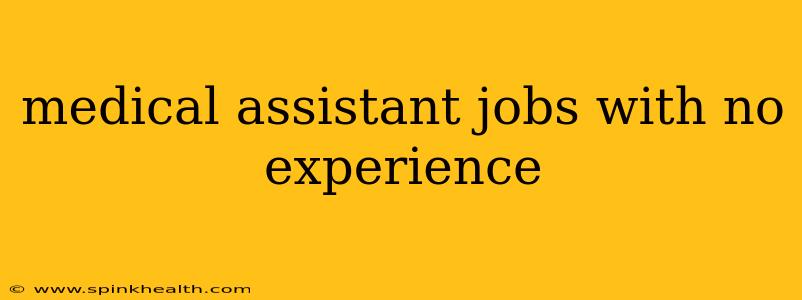Landing Your First Medical Assistant Job: A Beginner's Guide
So, you're dreaming of a career in healthcare, but the job postings all seem to demand experience you haven't yet had? Don't worry, you're not alone! Many aspiring medical assistants find themselves in this exact situation. The good news is that entry-level medical assistant jobs do exist, and this guide will help you navigate the path to securing your first one.
It all started for Sarah with a fascination for human biology and a deep desire to help people. She envisioned herself in a bustling clinic, assisting doctors and making a tangible difference in patients' lives. But the job hunt was daunting; every posting seemed to require years of experience – something Sarah, fresh out of her certification program, didn't possess.
This is where the journey begins. Let's address some key questions many aspiring medical assistants ask:
What are the typical entry-level requirements for a medical assistant?
Most employers value certification above all else. Completing a nationally accredited Medical Assistant program is your golden ticket. These programs teach you the essential skills: taking vital signs, assisting with exams, phlebotomy, electronic health record (EHR) management, and administrative tasks. Look for programs accredited by the Commission on Accreditation of Allied Health Education Programs (CAAHEP) or the Accrediting Bureau of Health Education Schools (ABHES). While experience is often preferred, many clinics are willing to invest in training motivated individuals with strong certifications.
What types of medical assistant jobs are available to those with no experience?
While a seasoned medical assistant might land a position in a high-demand specialty clinic, a beginner might start in a more general setting. Think family practice clinics, urgent care centers, or smaller physician offices. These settings often welcome entry-level MAs and provide excellent on-the-job training. Some clinics even offer paid apprenticeships or internships which are fantastic pathways to employment.
How can I make my application stand out when I lack experience?
This is where you showcase your other strengths. Your resume should highlight:
- Your certification: This is your most valuable asset. Emphasize the skills you acquired during your program.
- Clinical rotations: Detail your experiences during your program's clinical rotations, highlighting specific tasks and successes. Quantify your achievements whenever possible (e.g., "Assisted with over 100 patient check-ins").
- Volunteer work: Any volunteering experience in a healthcare setting or showing a commitment to helping others is beneficial.
- Soft skills: Medical assistants need strong communication, teamwork, and problem-solving skills. Highlight these attributes in your cover letter and interview.
- Your enthusiasm: Let your passion for healthcare shine through. Employers appreciate eagerness to learn and a genuine desire to help others.
What skills are most sought after by employers?
Beyond technical skills learned in your program (phlebotomy, EKGs, injections), employers value:
- Excellent communication: You'll be interacting with patients, doctors, and colleagues daily.
- Teamwork: Medical offices are collaborative environments.
- Computer proficiency: EHR systems are integral to the job.
- Attention to detail: Accuracy is crucial in healthcare.
- Adaptability: The medical field is dynamic; you need to be flexible.
How can I network to find unadvertised openings?
Don't underestimate the power of networking! Attend healthcare career fairs, join professional organizations like the American Association of Medical Assistants (AAMA), and connect with people in the industry on LinkedIn. Informational interviews with working medical assistants can provide invaluable insights and potential leads.
Sarah's journey wasn't easy, but by focusing on her certification, highlighting her soft skills, and networking diligently, she landed her first position at a local family practice. It wasn't the glamorous specialty clinic she initially envisioned, but it was the perfect launching pad for her career. With dedication, hard work, and a positive attitude, she quickly gained experience and moved on to her dream job a few years later. Remember, your first medical assistant job is just the beginning of a rewarding career. Your passion and persistence will pay off.

